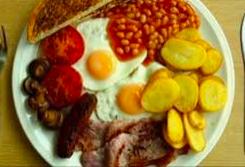Breakfast like a king, lunch like a prince and dine like a pauper is an old nutritional adage that at first glance would seemingly be supported by a recent study published in the Endocrine Society's Journal of Clinical Endocrinology & Metabolism.
But though the study made some interesting findings it certainly didn’t warrant the slew of overblown headlines that came with it. These are just a selection:
”People Who Eat a Big Breakfast May Burn Twice as Many Calories” (Science Daily)
“Eat a Big Breakfast to Lose Weight Fast” (the Sun)
“A Big Breakfast May Help You Burn Double the Calories” (Healthline)
“Wait, What? Study Shows Eating a Big Breakfast Can Lead to Weight Loss”
(MSN)
The study, at the University of Lubeck in Germany, actually involved just 16 healthy young men in an experimental crossover design. The men stayed at a research centre twice, a fortnight apart, for 72 hours each stay. On the evening of their arrival they had a standard evening meal, and then for the next two days, either:
- a low-calorie (11% of daily calories) breakfast, standard (20% of daily calories) lunch, high-calorie (69% of daily calories) dinner
- OR a high-calorie breakfast, standard lunch and low-calorie dinner
The subjects weren’t allowed to exercise, and during their stay researchers took regular measurements of their energy expenditure, blood glucose and insulin levels before and after meals.
On their second visit, the subjects were given the opposite of their original meal plan – i.e. those who had previously received a high-calorie breakfast and low-calorie dinner now received a low-calorie breakfast and high-calorie dinner, and vice versa.
The findings of the study? The men's dietary-induced thermogenesis, or DIT — the percentage of a meal’s calories burned off in the process of digesting that meal — was around 2.5 times higher after breakfast than after dinner, for both the high and low-calorie meals.
That’s certainly of note, but it doesn’t amount to anything like weight melting off effortlessly, or a doubling in daily calorie burn as implied.
As a theoretical example, imagine DIT was 20% of calories consumed at breakfast and 8% of calories consumed in the evening (both within the ballpark you could expect). Then assume you consumed 1000 calories for breakfast and 400 calories for dinner rather than the more usual 400 for breakfast and 1000 for dinner. In the first scenario you’d be burning off 232 calories in DIT across the two meals; In the second scenario, 160 calories – a saving of just 72 calories.
72 calories fewer isn’t totally meaningless, and dining late also had metabolic downsides in this study. Blood glucose was found to be 44% higher after a high-calorie dinner compared to a high-calorie breakfast, and 17% higher after a low-calorie dinner compared to a low-calorie breakfast. Concentrations of insulin were also 40% higher after a high-calorie dinner than after a high-calorie breakfast. The craving for sweets was reduced in those who ate a bigger early meal.
But how the body behaves under controlled conditions (i.e. in a study like this) may well not reflect what happens in real life.
In short, we don’t know whether eating a big breakfast every day would lead to weight loss in real-world conditions, or whether the results are relevant to women, people who are exercising, or who have health complications due to being overweight or obese.
Nor do we know if there is caloric compensation later in the day in uncontrolled conditions: do people actually eat smaller meals later on when they’ve had a big breakfast?
Some studies have suggested that eating a healthy breakfast does help people to eat less during the rest of the day, but one meta-analysis found that participants assigned to eat breakfast had a higher total daily energy intake than those assigned to skip breakfast.
So it’s a complicated picture that’s affected by many different factors, not least what fits in with your lifestyle and hunger cues.
Ultimately you’ll plan meal times to suit your individual circumstances – whether that’s bigger breakfast or bigger dinner, calories are still king.




